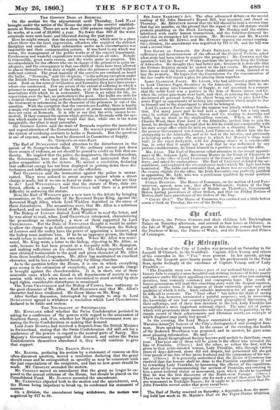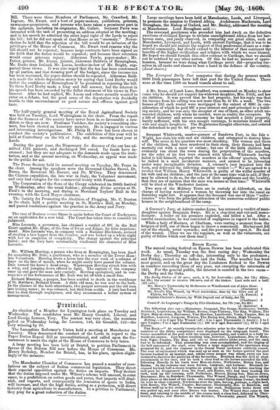t4t 31Irtrupnlio.
The freedom of the City of London was presented on Saturday to Sir Leopold M'Clintock, in the Guildhall. Captain Allen Young and others of his comrades in the " Fox " were present. In his speech, giving thanks, Sir Leopold gave hearty praise to his predecessors in the Polar Seas, spoke feelingly of the exertions of Captain Young, and of Lady Franklin " The Franklin story now forms a part of our national history ; and all history fails to supply a more beautiful and striking instance of heroic manly endurance under the most appalling circumstances ; and of no less enduring devotion, true womanly constancy and courageous hope. The youth of future generations will read this ennobling story with the deepest emotion, and will receive from it the impress of those eminently great and good qualities of which it tells. Such valuable instruction for all ages it would be difficult to overrate. The " final effort " has fallen far short of saving life. It has, however, terminated a painful suspense; and, in recovering the knowledge of our lost countrymen's great geographical discoveries, of their sufferings, and of their firm devotion to the last, Lady Franklin has accomplished a most important national object. The same act of justice which will perpetuate their memories will also transmit to posterity, in the simple record of their achievements and Christian worth, an example of which England may justly feel proud." In the evening, the Lord Mayor entertained a large party at the Mansion-housein honour of the City's distinguished and youngest free- man. More speaking ensued. In the course of the evening, the health of Sir Roderick Murchison was proposed, and in answer, he gave some most pleasing information. He said :-
" The Royal Geographical Society has two gold medals to distribute every year. This year one of these will be given to the officer who revealed the fate of Franklin. (Cheers.) And the other, or rather the first, will be given to that noble-minded woman, Lady Franklin, who, through twelve years of hope deferred, alone did not despair, but persevered till she got clear proofs of the fate of her brave husband and the companions of his voy- age. (Cheers.) It is generally understood that the House of Commons has resolved that due honour shall be done to the Franklin expedition—if not by rewarding Lady Franklin, by honouring the officers of the expedition, but above all by commemorating the services of Franklin, and erecting to him a great national statue or monument, npon which should be inscribed that he was the first discoverer of the North-west Passage. (Chee.,:s ) There can be no more appropriate site for such a record than near the Nel- son monument in Trafalgar Square, for it ought to be remembered that Sir John Franklin served under that great naval hero.
The Earl of Derby received on Saturday, a deputation from the meet- ing held last week in St. Martin's Hall on the Paper-Duties Abolition
Bill. There were three Members of Parliament, Mr. Crawford, Mr. Ingram, Mr. Ewart, and a host of paper-makers, publishers, printers, newspaper-proprietors, and persons who have taken a prominent part in. the agitation, including its originator, Mr. Collett. Serjeant Parry was intrusted with the task of presenting an address adopted at the meeting; and in his speech he admitted the strict legal right of the Lords to reject the bill ; but he did not speak of that House as an "anomaly." Never- theless he held that the rejection of the bill would be an invasion of the privileges of the House of Commons. Mr. Ewart read reasons why the bill should not be rejected ; because large contracts have been signed on the faith that the duties would be repealed ; and because their retention would cause grievous injury. Alderman Towle, paper-maker ; Mr. Potter, printer, Mr Evans, printer, Alderman Baldwin of Birmingham, Mr. Burke from Ireland, Mr. Lucas, brother-in-law of Mr. Bright, sup- ported these views. It was also urged that the tax has been condemned by all parties, and that forming part of the budget, since the income-tax has been increased, the paper-duties should be repealed. Alderman Bald- win made the whole deputation merry by saying that Lord Derby would forfeit the confidence of Birmingham if he persisted in rejecting the bill. To them Lord Derby made a long and full answer, but the interest in his speech has been exceeded by the fuller statement of his views in Par- liament. After he had replied, Mr. Lucas and others actually wanted to enter on a debate, but the good sense of the deputation was decidedly hostile to this encroachment on good nature and offence against good taste.
The half-yearly general meeting of the Royal Agricultural Society was held on Tuesday, Lord Walsingham in the chair. From the report that the finances of the society have never been in so favourable a con- dition as they are now. Professor Vcelcher, the society's consulting che- mist, has been elected an honorary member. He is engaged in various and interesting investigations. Mr. Philip H. Frere has been chosen to conduct the society's publications. The exhibition of this year will be held at Canterbury on the 9th of July, and the meeting next year at Leeds.
During the past year, the Dispensary for diseases of the ear has ad- mitted 1391 patients, and discharged 386 cured. Its funds have in- creased ; but they are not adequate to the demands made upon the insti- tution, and at the annual meeting, on Wednesday, an appeal was made to the public for aid.
The Peace Society held its annual meeting on Tuesday, Mr. Pease in the chair. Among the speakers were the Reverend Charles Stovel, Dr. Burns, the Reverend Mr. Burnet, and Dr. M'Cree. They denounced the Chinese expedition, the late war in. Italy, the Volunteer movement, and only had eulogies for the commercial treaty with France.
The Corporation of the Sons of the Clergy celebrated its 206th festival on Wednesday, after the usual fashion ; attending divine service at St. Paul's in the morning, and dining in Merchant Taylors' Hall in the evening, with the Lord Mayor chairman.
The Society for Promoting the Abolition of Flogging, Mr. C. Buxton in the chair, held a public meeting in St. Martin's Hall, on Monday, and passed resolutions against the practice in the Army and Navy.
The case of Beatson versus Skene is again before the Court of Exchequer, on an application for a new trial. The Court has taken time to consider its judgment.
Miss Lecomte, a governess, has obtained a verdict of 801. in the Bail Court against Mr. Hope, of the firm of Swan and Edgar, for false imprison- ment. Miss Lecomte was, in company with a Madame Blackman, accused of stealing a lace lappet from the counter, and was locked up a whole night with her on suspicion of complicity. The charge against the principal failed ; and the Jury have substantially vindicated the character of Miss Lecomte.
Mr. William Herring, a person who lives at Kennington, has been fined for assaulting Mr. Dale, a gentleman, who is a member of the Tower Ham- lets Volunteers. Herring drove a horse into the rear rank of a column of fours on the line of march, when he might easily have passed the column. Dale turned the horse's head away. Whereupon Herring struck him with a whip, and jumping down offered to fight. The captain of the company came up and gave the man into custody. Herring apologized, and in con- sequence of the forbearance of Mr. Dale was let off with a small fine.
Richard Manning, a pauper, has been scalded to death in the workhouse of St. Matthew, Bethnal Green. A dirty old man, he was sent to the bath. In the absence of the bath attendants, two pauper servants put the old man into boiling water ; he was released, but died from scalds. A jury has found that he died through negligence, and they recommend a better system of management.



























 Previous page
Previous page